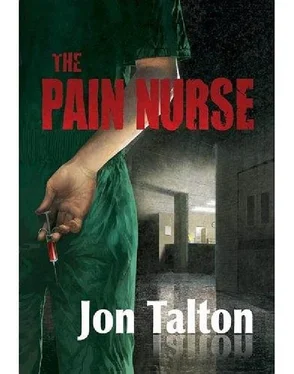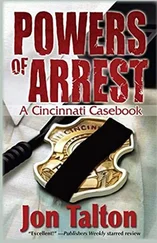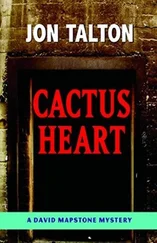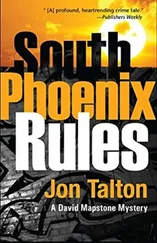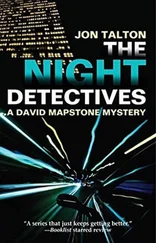“I just don’t know.”
“What don’t you know?”
“I don’t want to tell you how to do your job, but…”
“But?”
“I don’t know…”
“Lennie’s not the best witness, but he’s a start. I can give this to Dodds and let him do the rest. I can spend my time learning how to walk again.”
She wondered about that. The murder had seemed to animate him, transport him out of his troubles.
“I’m not convinced.”
He seemed flustered, hunched down in the seat. “So, convince me otherwise.”
“Well, first of all, Gary still scares me. It’s like he’s lost it. When he was standing in that room, swinging his hand like it was a knife, I could see him killing Christine in a rage.”
“I understand, but I’ve never told you all the details about the Mount Adams Slasher.” He went on to recount the similarities to Christine’s murder: the folded clothes, the murder weapon hidden as if to taunt the police, and the amputated ring finger. By the time he was through, she had pulled the car to the curb and shifted into park.
“I know it’s upsetting,” he said.
“I’ve seen worse.” She tried to toughen her voice. But she hadn’t lived worse. She had lived all these “MOs” that night in Christine’s office-alone-where she had been summoned by a message that nobody remembered taking. “It was as if someone wanted me to come down there. To witness it, or to be killed along with her?” That night’s timeline telescoped in and out in her mind. “Maybe someone knew I would be back at the hospital that night. That’s not brain surgery. I go back a lot-people hurt at night. Maybe it wasn’t Christine who left the message for me at the nurses’ station at all. Only, I spent more time with that patient, and maybe I was late getting down to the basement. My God, maybe I was meant to be killed, too. Why?”
Will adjusted his left leg. Even though he wasn’t in pain, she could tell he was in constant discomfort. Finally, he said, “The only thing that joined you and Dr. Lustig was Gary. And the method of the killing would mean he killed the three other women, and planted the evidence that implicated Craig Factor. A cop could do it. A respected doctor? Talk about brain surgery.”
“That’s what he does for a living,” she said humorlessly. “He’s very bright. And he knows the layout of the hospital. He would know about the old morgue and the elevator. Someone is trying to kill me! What if it’s him? What are you smiling at?”
“You.” He paused. “You’d make a good detective.” He wanted to say how happy he was to be out with her, how he loved her voice, with its light Southern accent that made her sentences sound like singing. It wouldn’t be right to say any of that. “Cheryl Beth, if this were an ordinary homicide, I’d ask you what enemies you had, although I can’t imagine you have any. I’d ask you why someone might want you dead. But this is the Slasher. If he’s after you, it’s because he thinks you witnessed the murder.”
“I’m just not sure.”
“You said, ‘first of all.’ What else?”
The car was starting to warm up. She unbuttoned her coat. “Judd Mason is another creep. There’s the whole letter thing, and then he cornered me in the ER the other day…”
“You didn’t tell me that.”
“There’s been a lot going on. He didn’t really threaten me. Just acted creepy. Said he knew I’d been spying on him. But he said the strangest thing. He said that he knew I’d been told not to talk about the murder, but he said it in exactly the same language as the vice president of nursing had told me just after it happened. Ever have a boss who’s a political weasel and got ahead for just that reason?”
“In the police? Never. All our bosses are selfless visionaries.”
“Ha. Well, this woman jumped down my throat about being involved with Gary, as if that never happens in a hospital. As if I didn’t feel bad about it enough already. Then she says, I am not to discuss Dr. Lustig’s murder with anyone: colleagues, patients, and absolutely not the press. Those are the same words Judd Mason said to me the other day.”
“Like he had some inside pipeline?”
“Exactly.”
Cheryl Beth had been insulted when Stephanie Ott had said it. It impugned her professionalism. But it also probably meant that Stephanie somehow knew about the romance Cheryl Beth had carried on for two years with one of the writers at the Cincinnati Post. It had been the most satisfying relationship since her divorce, and she had secretly indulged in every woman’s hope that it might lead to something-if not marriage, maybe they could live together, really be a couple, something. She had tried to keep the whole biological clock cliché at bay, all the time they saw each other, but keeping hope at bay had been more difficult. He had been smart and funny and worldly. He had been an amazing, giving lover. A real catch. But it was not to be.
He had left town three years ago. She hadn’t hated him-they had too much fun. She did miss his company, miss the hope, stopped listening to any sad songs. She missed him at odd moments, seeing a street they had walked down, a park where they had picnicked. He had introduced her to jazz and wine-we are so much the product of our old lovers. She missed the feel of his breathing on her shoulder as they slept together, and the way he always made love to her in the morning, before he left. Where Andy had lain atop her and humped, he would raise himself on his forearms and look at her with an angelic smile, and he had taught her so many positions. Damn, she hated thinking about it, and yet many days it was a warm, immediate memory. It did not last. Later, she realized how she had been rebound-vulnerable to Gary Nagle. It was her fault. Damn it. She kept all this to herself. Will probably thought she was a floozy already. Her family certainly did. Her mother couldn’t believe she would divorce Andy, but then she couldn’t believe Cheryl Beth didn’t want to live in that little town forever and just have kids.
“…Absolutely not the press.” It was as if they had been researching her life. But why? That was too paranoid.
“If it makes you feel any better, I don’t have an explanation for the letter, either,” Will said. “None of the other victims received letters. We do know that Christine had received threatening phone calls. Did you know that?”
“No.” She didn’t make an effort to drive. They sat stationary in the warm car.
“I’ve done some asking around,” Will said. “Berkowitz used to be on the force, and I convinced him to help me a little. The hospital was very sensitive about the murder. They wanted the publicity shut down, which I can understand. What’s unusual is that they weren’t leaning on the cops to get results, to close this case. They just wanted it to go away. Dodds is working alone; his partner’s on maternity leave. That was fine with them. Now that’s odd. In my experience, the big boss would have been on the phone to the chief demanding that fifty detectives be assigned to the case.”
“They just wanted it to go away,” Cheryl Beth said.
“Berkowitz said something about accreditation?”
“Yes,” she said. “The Joint Commission. They accredit the hospital. We just went through that.”
“Berkowitz said something was wrong. Some major problems, and accreditation might be withheld. Did you know about this?”
“We’ve been waiting for word.”
“They can’t just conceal it?”
“It’s public information,” Cheryl Beth said. “But I guess if nobody asks… I can’t believe they would try to conceal such a thing. You typically have time to lay out a plan to correct the problems. Hospitals can get partial or provisional accreditation. But Cincinnati Memorial? My God, we used to be the gold standard.”
Читать дальше
